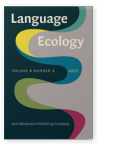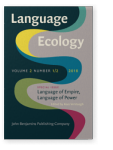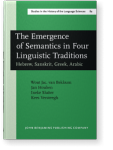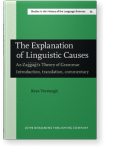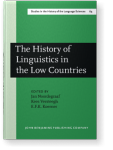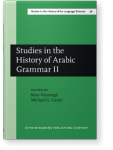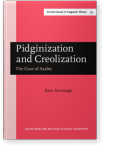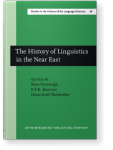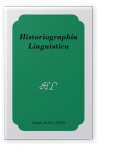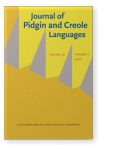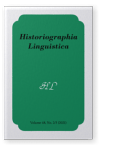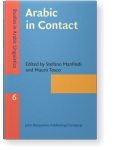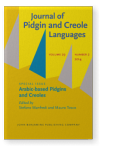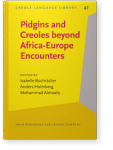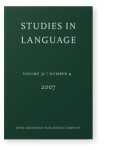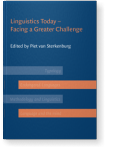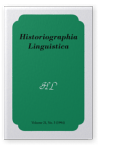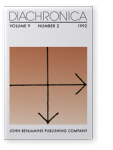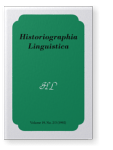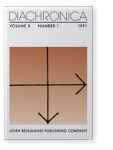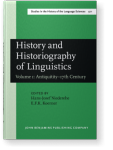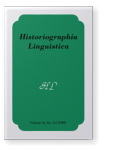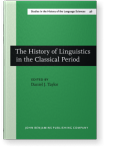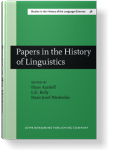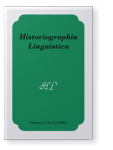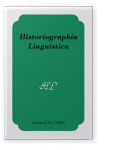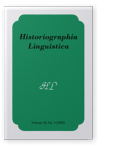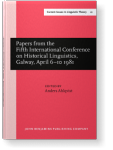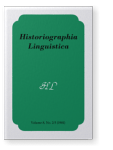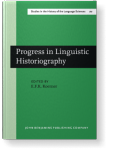Kees Versteegh
List of John Benjamins publications for which Kees Versteegh plays a role.
Journal
Language of Empire, Language of Power
Edited by Kees Versteegh
Special issue of Language Ecology 2:1/2 (2018) v, 146 pp.
Subjects Anthropological Linguistics | Contact Linguistics | Evolution of language | Historical linguistics | Language acquisition | Language policy | Multilingualism | Sociolinguistics and Dialectology
The Emergence of Semantics in Four Linguistic Traditions: Hebrew, Sanskrit, Greek, Arabic
Wout J. van Bekkum, Jan Houben, Ineke Sluiter and Kees Versteegh
[Studies in the History of the Language Sciences, 82] 1997. ix, 322 pp.
Subjects History of linguistics | Semantics
The Explanation of Linguistic Causes: Az-Zağğāğī's Theory of Grammar. Introduction, translation, commentary
Kees Versteegh
[Studies in the History of the Language Sciences, 75] 1995. xvi, 310 pp.
Subjects Afro-Asiatic languages | History of linguistics | Syntax
The History of Linguistics in the Low Countries
Edited by Jan Noordegraaf, Kees Versteegh and E.F.K. Koerner †
[Studies in the History of the Language Sciences, 64] 1992. vi, 400 pp. + ills.
Subjects History of linguistics
Studies in the History of Arabic Grammar II: Proceedings of the second symposium on the history of Arabic grammar, Nijmegen, 27 April–1 May, 1987
Edited by Kees Versteegh and Michael G. Carter
[Studies in the History of the Language Sciences, 56] 1990. x, 320 pp.
Subjects Afro-Asiatic languages | History of linguistics | Syntax
Pidginization and Creolization: The Case of Arabic
Kees Versteegh
[Current Issues in Linguistic Theory, 33] 1984. xiii, 194 pp.
Subjects Afro-Asiatic languages | Creole studies
The History of Linguistics in the Near East
Edited by Kees Versteegh, E.F.K. Koerner † and Hans-Josef Niederehe
[Studies in the History of the Language Sciences, 28] 1982. xii, 265 pp.
Subjects Afro-Asiatic languages | History of linguistics
2024 Review of Schöntag (2022):
Das Verständnis von Vulgärlatein in der Frühen Neuzeit vor dem Hintergrund der questione della lingua. Eine Untersuchung zur Begriffsgeschichte im Rahmen der sozio- und varietätenlinguistischen Verortung: Die sprachtheoretische Debatte zur Antike von Leonardo Bruni und Flavio Biondo bis Celso Cittadini (1436–1601), unter Berücksichtigung von Dante Alighieri und der mittelalterlichen Sprachphilosophie Historiographia Linguistica: Online-First Articles | Review
2022 Review of Schöntag (2022): Das Verständnis von Vulgärlatein in der Frühen Neuzeit vor dem Hintergrund der questione della lingua. Eine Untersuchung zur Begriffsgeschichte im Rahmen der sozio- und varietätenlinguistischen Verortung: Die sprachtheoretische Debatte zur Antike von Leonardo Bruni und Flavio Biondo bis Celso Cittadini (1436–1601), unter Berücksichtigung von Dante Alighieri und der mittelalterlichen Sprachphilosophie Historiographia Linguistica 49:1, pp. 141–147 | Review
2022 Marking statements of fact in early pidgins Journal of Pidgin and Creole Languages 37:1, pp. 53–71 | Article
The particle fi is used in Classical Arabic as a local and temporal preposition, ‘in’. In the contemporary Arabic dialects, it has the same meaning, but in addition it is used in some dialects as an existential, ‘there is/are’. In a number of Arabic work-related pidgins, such as Gulf Pidgin… read more
2021 The ghost of Vulgar Latin: History of a misnomer Historiographia Linguistica 48:2/3, pp. 205–227 | Article
The concept of a colloquial variety of Latin as an intermediate variety between Latin and the Romance languages has a long standing. Sometimes called Vulgar or Popular Latin, this variety is often conceptualized as a discrete linguistic variety, which is held responsible for the changes in the… read more
2018 Temporal adverbs of contrast in the Basic Variety of Arabic Arabic in Contact, Manfredi, Stefano and Mauro Tosco (eds.), pp. 233–250 | Chapter
This paper applies the model of the Basic Variety developed by Klein & Perdue (1997) and elaborated by Benazzo (2003) to two basic forms of communication in Arabic, Pidgin Madame and Gulf Pidgin Arabic. Benazzo’s analysis of the development of temporal adverbs of contrast (resultative already;… read more
2018 Language of empire, language of power Language of Empire, Language of Power, Versteegh, Kees (ed.), pp. 1–17 | Article
How do people in a position of power address those under their control? Do they impose their own language, possibly in a reduced version? Do they adopt a simple form of the language of the people they control? Do they employ a lingua franca that is commonly used in the region? Recent research… read more
2014 Speaking of the past: The development of past time reference in Arabic pidgins Arabic-based Pidgins and Creoles, Manfredi, Stefano and Mauro Tosco (eds.), pp. 211–231 | Article
In rudimentary communication with foreigners, the most basic need is to express wishes and to give orders. Accordingly, verbal forms in foreigner-directed speech and pidgins often derive etymologically from imperatives or infinitives in the lexifier language. In more developed communication the… read more
2014 Pidgin verbs: Infinitives or imperatives? Pidgins and Creoles beyond Africa-Europe Encounters, Buchstaller, Isabelle, Anders Holmberg and Mohammad Almoaily (eds.), pp. 141–170 | Article
Evidence from Arabic-based pidgins, such as Bongor Arabic, Juba Arabic, Pidgin Madame, and Gulf Pidgin Arabic, and from the Arabic-based creole Ki-Nubi, shows that in these varieties verbs often derive from Arabic imperatives. In some of the West European-based pidgins, verbs apparently derive from… read more
2007 Maarten Mous. 2003. The Making of a mixed Language: The case of Ma’a/Mbugu [Creole Language Library 26] Studies in Language 31:4, pp. 891–900 | Miscellaneous
2004 The future of creolistics Linguistics Today – Facing a Greater Challenge, Sterkenburg, Piet van (ed.), pp. 305–320 | Article
1994 The Notion of ‘Underlying Levels’ in the Arabic Grammatical Tradition Historiographia Linguistica 21:3, pp. 271–296 | Article
Even ‘naive’ speakers use a distinction between actual, realized speech with its ‘literal’ meaning, and an underlying level of ‘what is actually meant’. Such a distinction is made because speakers instinctively feel that very often actual speech does not represent exactly what the speaker intends… read more
1992 The Debate Concerning Latin and Early Romance Diachronica 9:2, pp. 259–285 | Article
1991 The Substratum Debate in Creole Linguistics Diachronica 8:1, pp. 59–80 | Article
1990 Are Linguists Ridiculous? A heavenly discussion between grammarians in the 11th century History and Historiography of Linguistics: Proceedings of the Fourth International Conference on the History of the Language Sciences (ICHoLS IV), Trier, 24–28 August 1987, Niederehe, Hans-Josef and E.F.K. Koerner † (eds.), pp. 147–156 | Chapter
1990 Freedom of the Speaker? The Term Ittisā' and Related Notions in Arabic Grammar Studies in the History of Arabic Grammar II: Proceedings of the second symposium on the history of Arabic grammar, Nijmegen, 27 April–1 May, 1987, Versteegh, Kees and Michael G. Carter (eds.), pp. 281–294 | Article
1987 Latinitas, Hellenismos, ‘Arabiyya The History of Linguistics in the Classical Period, Taylor, Daniel J. (ed.), pp. 251–274 | Article
1987 Marginality in the Arab Grammatical Tradition Papers in the History of Linguistics: Proceedings of the Third International Conference on the History of the Language Sciences (ICHoLS III), Princeton, 19–23 August 1984, Aarsleff, Hans, L.G. Kelly and Hans-Josef Niederehe (eds.), pp. 87–96 | Article
1986 Latinitas, Hellenismos, ‘Arabiyya Historiographia Linguistica 13:2/3, pp. 425–448 | Article
The central thesis of this paper is that from the time of the Alexandrian conquests the Greek-speaking community was characterized by a diglossia in which the Attic dialect became the standard language, while a simplified version of this dialect served as the colloquial. On the basis of a… read more
1983 History of eastern linguistics in the Soviet Union Historiographia Linguistica 10:3, pp. 289–307 | Review article
1982 A Dissenting Grammarian: Qutrub on Declension The History of Linguistics in the Near East, Versteegh, Kees, E.F.K. Koerner † and Hans-Josef Niederehe (eds.), pp. 167–194 | Article
1982 Structural change and pidginization in the history of the Arabic language Papers from the Fifth International Conference on Historical Linguistics, Galway, April 6–10 1981, Ahlqvist, Anders (ed.), pp. 362–373 | Article
1981 A Dissenting Grammarian Qutrub on Declension Historiographia Linguistica 8:2/3, pp. 403–429 | Article
This paper is concerned with a theory held by the Arab grammarian Qutrub (d.206/821) with regard to the inflectional vowels of the noun in Arabic. Contrary to what most grammarians believed, he asserted that these vowels do not serve to indicate (syntactic) functions, but to prevent the… read more
1980 Hellenistic Education and the Origin of Arabic Grammar Progress in Linguistic Historiography: Papers from the International Conference on the History of the Language Sciences, Ottawa, 28–31 August 1978, Koerner, E.F.K. † (ed.), pp. 333–344 | Article
